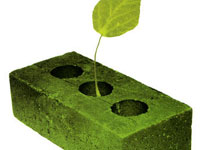
By now, the collective conscious is familiar with the term “green” in its environmental sense. Many corporations have “sustainability” reports that highlight the triple bottom line – economy, society, and the environment. Others say that building green is the best way to attract tenants and retain them, citing reduced operating costs and increased property values.
Now, “green building” is slowly creeping into Wisconsin law. Recently the Wisconsin Legislature passed Senate Bill 616 requiring that plans and specifications for major state construction projects conform to requirements under the Leadership in Energy and Efficiency Design (LEED) Green Building Rating System at the “silver” performance level.
The U.S. Green Building Council (USGBC) oversees the LEED certification rating system, which creates checklists for different types of projects and awards points for inclusion of certain specifications. Categories include sustainable site development, water and energy efficiency, materials selection, and indoor environmental quality.
As of April 1, 2010, the USGBC reported that “various LEED initiatives including legislation, executive orders, resolutions, ordinances, policies and incentives are found in 45 states … 34 state governments, 14 federal agencies or departments, 17 public school jurisdictions and 41 institutions of higher education across the United States.”
Gov. Jim Doyle’s Executive Order 145 (April 11, 2006) − relating to the creation of high performance green building standards and energy conservation for state facilities − made this list, as well as Madison’s Res. 08-00109 (Jan. 22, 2008) requiring green building certification for new city buildings.
If California is a trend-setter, then it is worthy to note that California recently adopted the first-in-the-nation mandatory Green Building Standards Code for all new buildings, not just state-owned ones. That means construction and real estate lawyers in other states might see similar initiatives impacting private enterprise in the future.
Harvard Law School released a paper last year discussing the legal risks and liability issues associated with green building, noting that “[a]s energy prices soar, society becomes more aware of environmental sustainability issues, and cities begin to mandate more sustainable development practices, green building will increasingly become a way of life.”
Wisconsin real estate lawyer Michael H. Simpson of Reinhart Boerner Van Deuren S.C., Milwaukee, says the green movement is the result of several social, environmental, and economic factors – primarily global warming, trade competition, and increasing energy costs.
These factors are “driving the bottom line of new construction” said Simpson, one of five panelists presenting “Sustainability and Green Development” today at the State Bar of Wisconsin’s Annual Convention. “An owner must look at construction costs and the life cycle of the building itself. Meanwhile, we are beginning to see changes in regulation.”
In a 2009 Wisconsin Lawyer article, author Michael R. Christopher of DeWitt Ross and Stevens, S.C., Madison, noted that “[l]awyers well-versed in the green building protocol can help clients articulate their motivation for going green, identify the opportunities and benefits, and suggest creative solutions to minimize the risks inherent in green development.”
Christopher believes that economic and non-economic incentives at the federal, state, and local levels encourage green development, and lawyers must be versed on the issues. Christopher discusses how litigation could result when green projects are tied to tax credits that depend on proper construction to meet certain guidelines like LEED and how these issues can implicate owners, contractors, and design professionals.
Those interested in learning more about this issue should attend the “Sustainability and Green Development” panel, which begins today (May 5) at 1 p.m.
Follow the Annual Convention through the State Bar’s Facebook and Twitter pages. If you’re tweeting during the convention, use the hashtag #SBWconv10.
By Joe Forward, Legal Writer, State Bar of Wisconsin
Related: Green development opportunities and risks − June 2009, Wisconsin Lawyer
